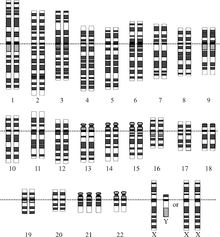
Back اختلال الصيغة الصبغية Arabic Анеуплоидия Bulgarian Aneuploidija BS Aneuploïdia Catalan Aneuploidie Czech Aneuploidie German Ανευπλοειδία Greek Aneuploidía Spanish Aneuploidsus Estonian آنیوپلوئیدی Persian
| Aneuploidy | |
|---|---|
 | |
| Chromosomes in Down syndrome, one of the most common human conditions due to aneuploidy. There are three chromosomes 21 (in the last row). | |
| Specialty | Medical genetics |
Aneuploidy is the presence of an abnormal number of chromosomes in a cell, for example a human cell having 45 or 47 chromosomes instead of the usual 46.[1][2] It does not include a difference of one or more complete sets of chromosomes. A cell with any number of complete chromosome sets is called a euploid cell.[1]
An extra or missing chromosome is a common cause of some genetic disorders. Some cancer cells also have abnormal numbers of chromosomes.[3][4] About 68% of human solid tumors are aneuploid.[4] Aneuploidy originates during cell division when the chromosomes do not separate properly between the two cells (nondisjunction). Most cases of aneuploidy in the autosomes result in miscarriage, and the most common extra autosomal chromosomes among live births are 21, 18 and 13.[5] Chromosome abnormalities are detected in 1 of 160 live human births. Autosomal aneuploidy is more dangerous than sex chromosome aneuploidy, as autosomal aneuploidy is almost always lethal to embryos that cease developing because of it.
- ^ a b Griffiths AJ, Miller JH, Suzuki DT (2000). An Introduction to Genetic Analysis (7 ed.). pp. Chapter 18.
- ^ Santaguida, Stefano; Amon, Angelika (2015-08-01). "Short- and long-term effects of chromosome mis-segregation and aneuploidy". Nature Reviews Molecular Cell Biology. 16 (8): 473–485. doi:10.1038/nrm4025. hdl:1721.1/117201. ISSN 1471-0080. PMID 26204159. S2CID 205495880.
- ^ Sen S (January 2000). "Aneuploidy and cancer". Current Opinion in Oncology. 12 (1): 82–8. doi:10.1097/00001622-200001000-00014. PMID 10687734. S2CID 24886651.
- ^ a b Duijf, P.H.G.; Schultz, N.; Benezra, R. (2013), "Cancer cells preferentially lose small chromosomes", Int J Cancer, 132 (10): 2316–2326, doi:10.1002/ijc.27924, PMC 3587043, PMID 23124507
- ^ Driscoll DA, Gross S (June 2009). "Clinical practice. Prenatal screening for aneuploidy". The New England Journal of Medicine. 360 (24): 2556–62. doi:10.1056/NEJMcp0900134. PMID 19516035.
© MMXXIII Rich X Search. We shall prevail. All rights reserved. Rich X Search